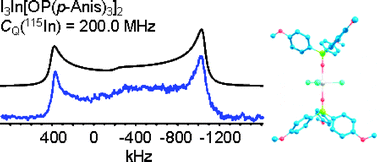Solid-state 115In NMR study of indium coordination complexes†
Abstract
The feasibility of solid-state 115In

* Corresponding authors
a
Department of Chemistry, University of Alberta, Edmonton, Alberta, Canada
E-mail:
roderick.wasylishen@ualberta.ca
Fax: +1 (1)780 492 8231
Tel: +1 (1)780 492 4336
b Steacie Institute for Molecular Sciences, National Research Council Canada, Ottawa, Ontario, Canada
The feasibility of solid-state 115In

 Please wait while we load your content...
Something went wrong. Try again?
Please wait while we load your content...
Something went wrong. Try again?
F. Chen, G. Ma, R. G. Cavell, V. V. Terskikh and R. E. Wasylishen, Chem. Commun., 2008, 5933 DOI: 10.1039/B814326A
To request permission to reproduce material from this article, please go to the Copyright Clearance Center request page.
If you are an author contributing to an RSC publication, you do not need to request permission provided correct acknowledgement is given.
If you are the author of this article, you do not need to request permission to reproduce figures and diagrams provided correct acknowledgement is given. If you want to reproduce the whole article in a third-party publication (excluding your thesis/dissertation for which permission is not required) please go to the Copyright Clearance Center request page.
Read more about how to correctly acknowledge RSC content.
 Fetching data from CrossRef.
Fetching data from CrossRef.
This may take some time to load.
Loading related content
